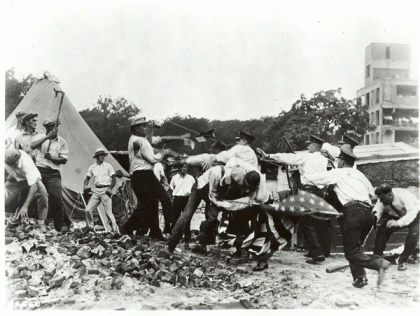
The sight of protestors camping out in tents may be new to people in lower Manhattan, but the act of aggrieved citizens taking over a location has precedent in the United States, says Duke historian Robert Korstad.
"Occupying space -- whether it's public space, work space, commercial space -- is actually a very traditional form of protest," says Korstad, a co-director of the Duke Program on History, Public Policy and Social Change. "There's a long history and we're seeing just another moment of that."
Here, Korstad lists his top five "occupy" demonstrations in the U.S.:
1. Bonus Army March, 1932. A month-long encampment in Washington, D.C., by thousands of World War I veterans and their families. These unemployed vets demanded immediate payment of service bonuses that were scheduled to be paid in 1945.
2. The Flint sit-down strike of 1937. Thousands of General Motors workers organized by the United Auto Workers occupied their factory for six weeks in order to obtain union recognition.
3. Greensboro Sit-ins, 1960. Four students from the historically black North Carolina A & T College sat down at a Woolworth's lunch counter and demanded to be served. The sit-in movement spread quickly across the South and helped end racial segregation in many commercial establishments.
4. Poor People's Campaign/ Resurrection City, 1968. An encampment in Washington, D.C., designed to bring attention to the plight of America's poor. Participants included blacks, whites, Hispanics and Native Americans, and took place only weeks after the assassination of Dr. Martin Luther King, Jr.
5. Anti-Apartheid disinvestment campaign, 1980s. This effort to get American universities to divest their holdings in companies doing business with South Africa involved the building and occupation of shantytowns on campuses across the country. These public protests put pressure on corporations and helped bring down the apartheid regime.
Korstad discussed the history of social movements in a recent "Office Hours" conversation. Watch it here.